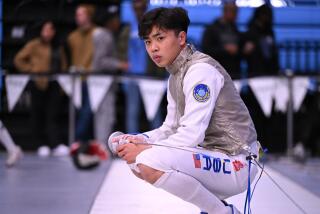Living by the Sword Is All Snyder Needs to Foil Competitors
- Share via
CHATSWORTH — Derek Snyder’s commitment to fencing leaves little room for teenage frivolity.
“I practice constantly,” he said. “My friends and I joke that I have no life. But it’s not a joke. Honestly, I don’t do anything except fence and eat and sleep.”
Snyder, a Chaminade High senior who lives in Chatsworth, has ranked among the top boys’ fencers in the nation almost since his introduction to the sport during a summer-school class five years ago.
“I thought, ‘I’ll just do this for four weeks and that will be it,’ ” he said. “But I got fascinated.
“At first, all my friends would kind of poke fun at fencing. But I don’t really get much of that anymore.”
That’s because fencing has become more than fun and games for the 17-year-old.
“We call it a high-speed chess match with a deadly ending,” he said.
Actually, no one dies in fencing duels. But more than a few opponents have fallen at the quick hands of Snyder.
He won his third consecutive national title earlier this month at the U.S. Fencing Assn. Summer National Championships in Austin, Texas. His title came in the 1-A men’s open foil division, which included fencers of all ages.
Last year, Snyder won the cadet foil division for fencers 17 and under, and he won the youth 14 foil title in 1998.
Snyder (5 feet 11, 155 pounds) won gold medals in the 16-and-under and 19-and-under divisions at the Pacific Coast Junior Championships at Chaminade in April, and he won the gold medal in the senior men’s foil division at the Pacific Coast Senior Championships in Sacramento in May. The Pacific Coast tournaments included competitors from California, Hawaii, Nevada and Arizona.
“He’s kind of outgrown everything around here,” said Father Lawrence Calhoun, a chaplain at Notre Dame High who coaches the Chaminade fencing team and introduced Snyder to the sport.
“There’s no one better on the West Coast right now. He doesn’t have a lot of competition.”
Finding fencers to spar might be Snyder’s greatest challenge as he prepares for college competition and attempts to make the U.S. team that will compete in the Junior World Championships in Poland in April.
Micha Itkin, a coach with the former Soviet Union’s 1988 Olympic fencing team who has worked with Snyder for four years, says top-level fencers need strong practice competition to stay sharp.
“He needs to have people stronger than him, or at least be able to fence with him,” Itkin said of Snyder. “That’s his biggest problem.”
Itkin, who came to the U.S. in 1992, coaches junior fencers at the Beverly Hills Fencing Club, where Snyder works out three times a week. Snyder also practices two hours a day at Chaminade and occasionally ventures to the Westside Fencing Center in Culver City and to New York in search of tougher competition.
“Fencing is a lot bigger on the East Coast,” Snyder said.
The hard work has paid off for Snyder, whose talent was evident from the start.
“You could just kind of tell he was going to be good,” Calhoun said. “He has an innate sense of timing, and that’s something that you can’t teach.”
Snyder is among an elite group expected to contend for three spots on the U.S. Junior World Championship team next year. Others include Steve Gerberman, a former Simi Valley resident now living in Texas, and twins Jeremy and Gabe Sinkin of New York.
As for college, Snyder is considering Stanford, Princeton, Columbia, Notre Dame, Pennsylvania, Penn State and Yale.
“The idea of the dumb jock just doesn’t happen in fencing,” said Don Snyder, Derek’s father, who recently took up the sport himself. “That’s one reason it has thrived in the Ivy League. It’s cerebral, and there’s quite a learning curve.”
Derek Snyder negotiated the curve easily, benefiting from quick reflexes and competitive drive, said Gerberman, a close friend who is among Snyder’s chief rivals.
“He’s got a lot of coordination and he wanted to be good,” Gerberman said. “Within the past year, especially, he’s gotten a lot better.”
Snyder demonstrated that during the recent national championships, which also served as the U.S. Olympic trials. He placed ninth among 53 fencers in men’s foil. He was eliminated from the trials by Sean McClain, an alternate on the 1996 Olympic team.
“It was kind of a test for myself because I’ve been practicing so much, to see where I stood,” Snyder said. “My goal was to make the top 16, and I did that. And to do it against people who barely missed the Olympics was really amazing.”
Snyder’s long-range goals include qualifying for the Olympics in 2004, 2008 and 2012.
“He’s a smart kid and I believe he has the potential to do it, but he’s not an Olympian yet,” Itkin said. “He has achieved a certain level, but he’s still got a lot more he can accomplish.”
Touche, Snyder said.
“When I started, it was just something I was good at, and we were thinking of college scholarships,” he said.
“Now, it’s pretty much turned into an Olympic dream.”
More to Read
Get our high school sports newsletter
Prep Rally is devoted to the SoCal high school sports experience, bringing you scores, stories and a behind-the-scenes look at what makes prep sports so popular.
You may occasionally receive promotional content from the Los Angeles Times.






